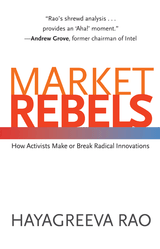Today, I spoke with Hayagreeva Rao, who is a professor at Stanford Business School and author. He talks about what a “market rebel” is, why they are important, some examples of rebels, the benefits and how personal branding relates. Hayagreeva makes a great case why you should become a market rebel to stand out amongst your peers and start innovating to change the world. Although, market rebels aren’t readily visible, they are able to innovate within company’s or as entrepreneurs. Innovation causes change and change is needed for progress!
What are market rebels? Why are they important?
“Market rebels are activists who challenge the status quo and defy conventional wisdom.”
The Compact Oxford English Dictionary defines a rebel as one who resists “authority, control or convention”. Market rebels are important because they spearhead collective action that takes the form of social movements. In turn, these social movements can either advance a radical innovation or block it. In either case, market rebels construct ‘hot causes’ to harness the attention of distracted audiences and rely on ‘cool’ techniques to mobilize collective action.
For example, the market rebels at the vanguard of the personal computing movement had a ‘hot cause’ – centralized computer and a computer that could only be touched by a priestly class, and a ‘cool’ technique of mobilization – ‘homebrewing’ clubs where people could assemble their own machine and personalize computing and gain autonomy.
They played a crucial role in in spawning new firms that led to the birth of the personal computer industry. Similarly, deaf rights activists challenged producers of cochlear ear implants and thwarted the spread of the technology. Their ‘hot cause’ was the loss of sign language and the demise of a deaf culture, and their cool techniques of mobilization included public marches and destruction of cochlear ear implants, and even litigation.
What are the benefits of market rebels?
Market rebels promote collective goods and play decisive role when normal market incentives do not work. For example, in the early automobile industry, the car was not culturally accepted and was seen as a devilish monstrosity. Advertising by car producers was widely distrusted. In these circumstances, auto enthusiasts banded together into automobile clubs, and lobbied state governments for speed limits and licensing and prevented a maze of local regulations.
They organized reliability races which paved the way for producers to win them and establish reputations. They also lobbied for good roads. All of this made mass production by Henry Ford possible. Market rebels played similar roles in the birth of the microbrewing industry, and the growth of new styles such as nouvelle cuisine. In all of these cases, they advanced radical innovations. But market rebels also play an important role in blocking thwarting radical innovations. For instance, they championed the cause of small stores and sought to stem the advance of chain stores and they organized an anti-biotechnology movement which prevented German pharmaceutical firms from commercializing bio-technology.
Can you name a few market rebels who have helped build our culture/businesses?
In contemporary times, a wide range of market rebels have played important roles in the evolution of industries. The important thing to keep in mind is that they are individuals who submerge their identity in a common cause and so rarely stand out in the public eye. Instead, it is the organizations they build and the collective action they spark that leaves a lasting imprint.
The free software movement, where “free” means “free” as in “free speech” and not “free beer”, played an important role in the spread of Linux – Linus Torvalds comes to mind. In microbrewing, Charles Papazian laid the foundations of the homebrewing movement, and entrepreneurs such as Fritz Maytag played were influential in the growth of small producers who made beer using authentic ingredients and artisanal techniques. On the other side, investor rights activists such as Evelyn Davis and the Gilbert Brothers and Nell Minnow were at the vanguard of the investor rights movement which improved corporate disclosure and monitoring of executive compensation.
What would the world look like without these market rebels?
We would not have the Automobile Association of America – it was started by auto enthusiasts who formed auto clubs all over the country. There would ne no brewpubs or microbrews in grocery store aisles. Organic food would not have taken root in American culture. All of these are cases, where market rebels were the harbingers of social movements that led to radical innovation. But for market rebels, we would have more Walmarts and Big Box stores all over the country. But for the environmental movement there would be no hybrid cars and consumer interest in the electric car.
Related Stories from Personal Branding Blog
If you brand yourself as a market rebel, how will it help your career?
Being a market rebel gives you a distinctive identity and visibility as an outsider. But they come at a price – you are more likely to be in small organizations rather than large bureaucracy and not have large financial resources. Which is why rebels exploit ‘hot causes’ and rely on ‘cool mobilization’ techniques to inspire action. In this sense, it is your cause and techniques that brand you.
——–
Hayagreeva Rao is the author of Market Rebels: How Activists Make or Break Radical Innovations. He is the Atholl McBean Professor of Organizational Behavior and Human Resources at Stanford Business School. He has published widely in the fields of management and sociology and studies the social and cultural causes of organizational change. His research has been published in journals such as the Administrative Science Quarterly, American Journal of Sociology, American Sociological Review, Academy of Management Journal, Organization Science and Strategic Management Journal. He has been a Member of the Organizational Innovation and Change Panel of the National Science Foundation. He is a Fellow of the Center for Advanced Study in Behavioral Science and of the Sociological Research Association. He is also a Fellow of the Academy of Management.






